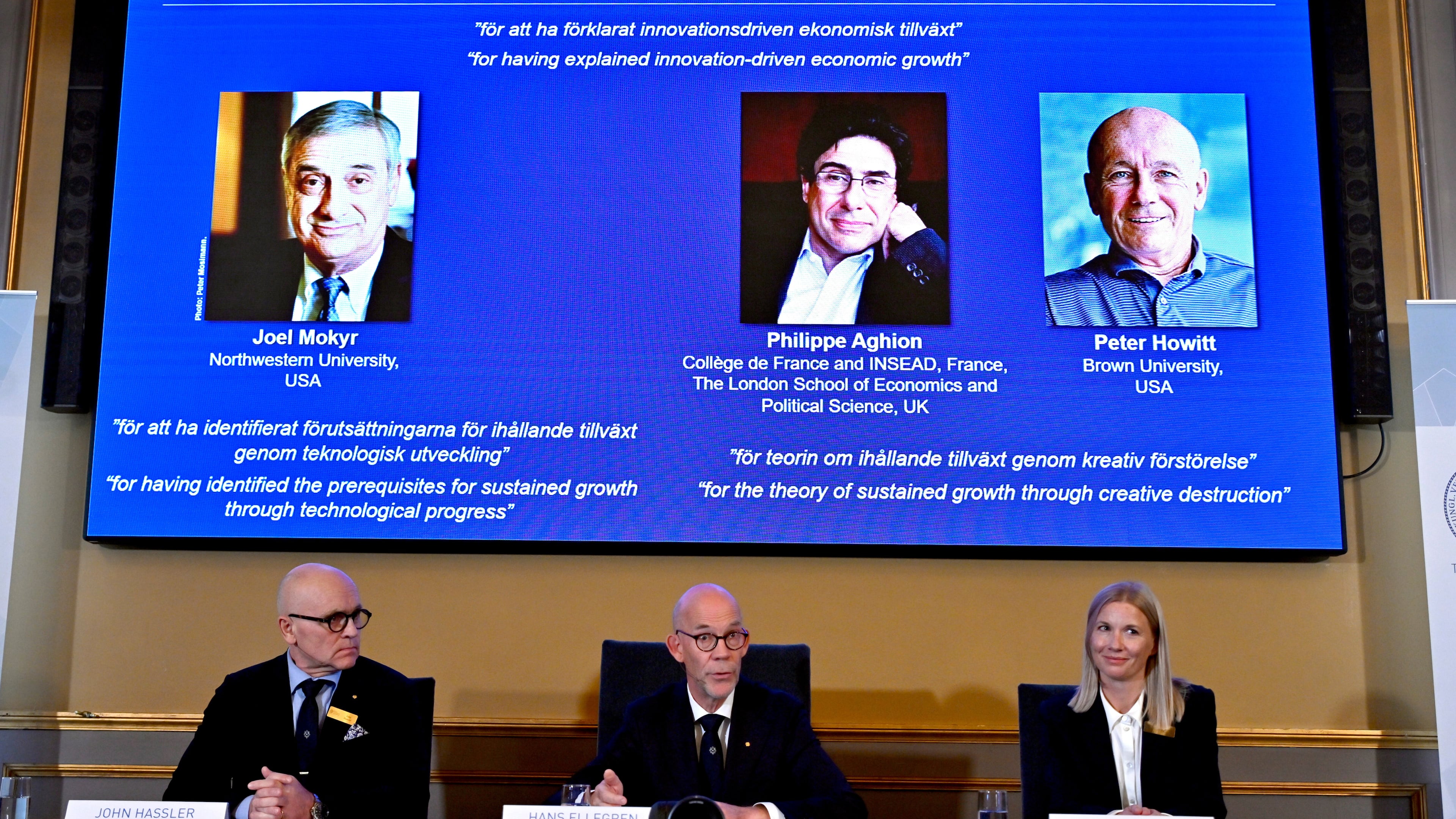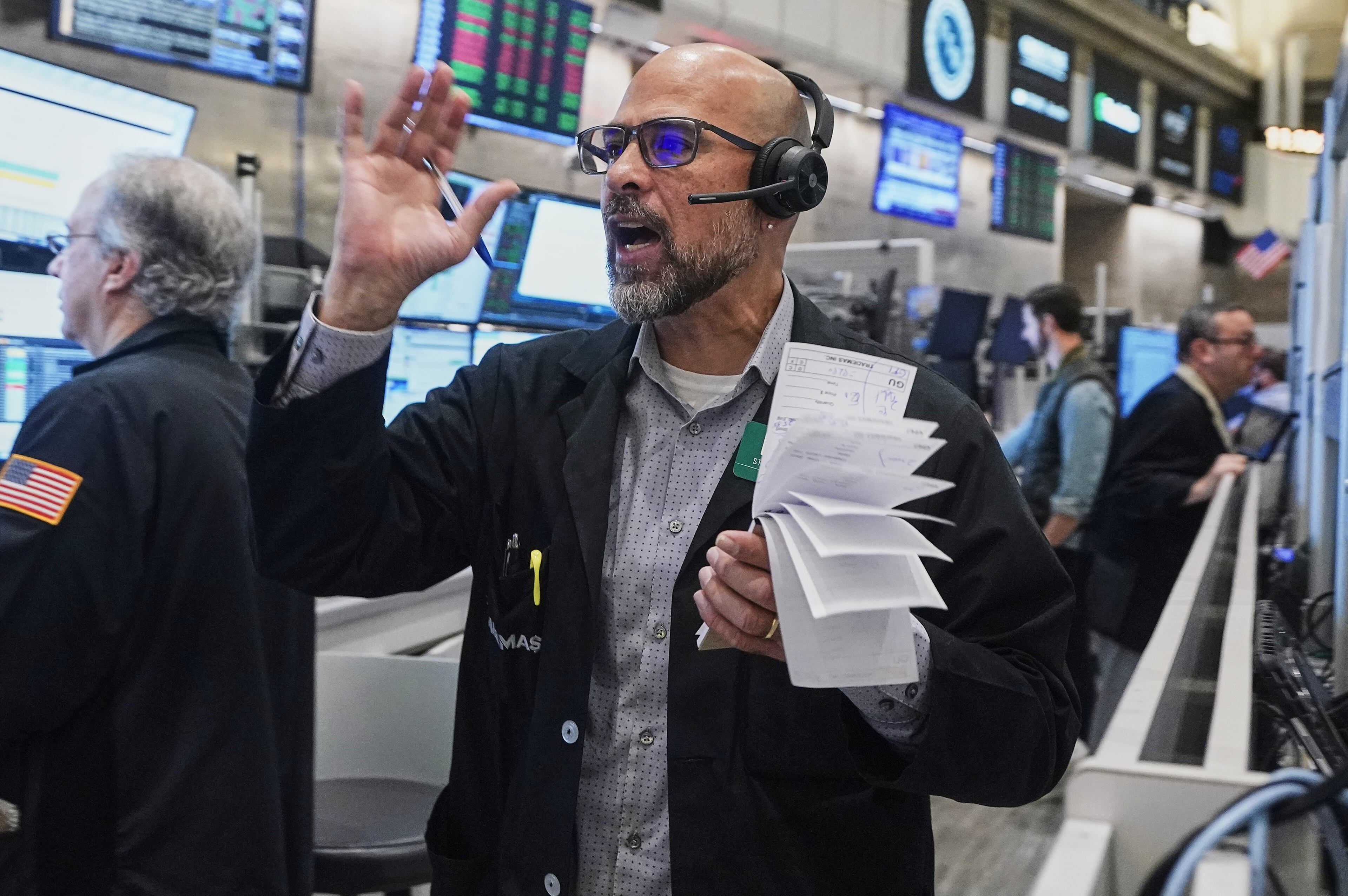Nobel economics prize goes to 3 researchers for explaining innovation-driven economic growth

STOCKHOLM (AP) — Three researchers who probed the process of business innovation won the Nobel memorial prize in economics Monday for explaining how new products and inventions promote economic growth and human welfare, even as they leave older companies in the dust.
Their work was credited with helping economists better understand how ideas and technology succeed by disrupting established ways — a process as old as steam locomotives replacing horse-drawn wagons and as contemporary as e-commerce shuttering shopping malls.
The award was shared by Dutch-born Joel Mokyr, 79, who is at Northwestern University; Philippe Aghion, 69, who works at the Collège de France and the London School of Economics; and Canadian-born Peter Howitt, 79, who is at Brown University.
A clearer understanding of ‘creative destruction’
The winners were credited with better explaining and quantifying “creative destruction,” a key concept in economics that refers to the process by which new innovations replace older technologies and businesses.
The concept is usually associated with economist Joseph Schumpeter, who outlined it in his 1942 book “Capitalism, Socialism and Democracy.” Schumpeter called the concept “the essential fact about capitalism.”
The Nobel committee said Mokyr “demonstrated that if innovations are to succeed one another in a self-generating process, we not only need to know that something works, but we also need to have scientific explanations for why.”
Aghion and Howitt studied the mechanisms behind sustained growth, including in a 1992 article that offered a complex mathematical model for creative destruction that added new aspects not included in earlier models.
Examples of creative destruction include e-commerce disrupting retail, streaming services replacing videocassette and DVD rentals and internet advertising undermining newspaper advertising. A classic illustration is horse-cart whip makers put out of business by the automobile.
Process is key to economic growth and human welfare
“The laureates’ work shows that economic growth cannot be taken for granted. We must uphold the mechanisms that underlie creative destruction, so that we do not fall back into stagnation,” said John Hassler, chair of the committee for the prize in economic sciences.
Howitt and Aghion’s model showed that markets with too few dominant companies can hinder innovation and growth — a concern that has been raised about industries such as telecommunications, social media platforms and airlines.
They found it was important to support people who are affected by changes while making it easy to move to more productive workplaces — to protect workers more than specific jobs. They also stressed the importance of social mobility, where a person's profession or trade is not defined by their parents' identity.
Mokyr has long been known as an optimist about technological innovation. About a decade ago, many economists took a more pessimistic view, arguing that inventions such as smartphones or even the internet had less of an economic impact than previous developments such as the airplane or the car.
Mokyr responded that because many new services were either cheap or free, their impact wasn’t evident in economic data, but they still provided enormous benefits.
In an interview with The Associated Press in 2015, he cited the music streaming service Spotify as an example of an “absolutely astonishing” innovation that economists had difficulty measuring. Mokyr noted he once owned more than 1,000 CDs and many vinyl records, but now he could access a huge music library for a small monthly fee.
He acknowledged that new inventions often cause at least short-term job loss or reduced earnings for workers. Like many economists, he argued that innovations also created unexpected jobs that offered fresh opportunities.
The Nobel committee noted that for much of human history, economic stagnation, rather than growth, was the norm. Starting with the Industrial Revolution in the 18th century, European and later other economies began to grow.
Innovation — and how to foster it — is an urgent question in Europe, where a report by former European Central Bank head Mario Draghi argued that Europe faces a rising productivity gap with the U.S. in digital technology. Aghion said the challenge was for Europe to keep pace with the U.S. and China in innovation by promoting research and the venture capital financing to turn ideas into businesses.
“We have to wake up," he told AP. "Because you know who will win in this competition? Those who innovate.”
The effects of artificial intelligence
Aghion said he believes artificial intelligence has “huge growth potential, but it all depends on the institutions and policies we put in place.” He said policies need to foster competition because big actors already in the sector know how to manage regulations, and that may discourage new entrants.
Mokyr said the notion that AI is a “monstrosity” that will drive humans into extinction comes from “people who have read too much dystopian fiction. Nothing of the sort is ever going to happen.”
Instead, he said at a news conference at Northwestern that he views it “primarily as a magnificent research assistant” that can gather and process information quickly.
He also disputed the notion that machines replace people. “They move us to more interesting, more challenging work," he said.
Early morning surprises
Mokyr said he awoke around 5 a.m. and opened his laptop to find multiple congratulatory messages, which confused him. He checked his phone and saw a message from a Swedish number. He called it and was told he won the prize.
“I think I sat there for 15 minutes, sort of dazed,” he told AP in an interview at his home in Skokie, Illinois. He will turn 80 next summer but said he has no plans to retire.
“This is the type of job that I dreamed about my entire life,” he said.
Howitt said he discovered he had won the Nobel prize when a Swedish reporter called him as he was waking up. At first, he thought it was a hoax.
“We had no Champagne in the refrigerator. We were not anticipating this,” he joked with reporters.
Aghion said the Nobel committee did not have his co-winners’ contact information, so they asked him for it.
"It’s really the dream prize, with the people I dreamed of getting it with,” Aghion said.
What exactly did the three economists win?
One half of the 11 million Swedish kronor (nearly $1.2 million) prize goes to Mokyr, and the other half is shared by Aghion and Howitt. Winners also receive an 18-carat gold medal and a diploma.
The economics prize is formally known as the Bank of Sweden Prize in Economic Sciences in Memory of Alfred Nobel. The central bank established it in 1968 as a memorial to Nobel, the 19th-century Swedish businessman and chemist who invented dynamite and established the five Nobel Prizes.
Since then, it has been awarded 57 times to a total of 99 laureates. Only three of the winners have been women.
Nobel purists stress that the economics prize is technically not a Nobel Prize, but it is always presented together with the others on Dec. 10, the anniversary of Nobel’s death in 1896.
Nobel honors were announced last week in medicine, physics, chemistry, literature and peace.
___
McHugh reported from Frankfurt, Germany. Rugaber reported from Washington and Corder from The Hague, Netherlands. Associated Press journalists John Leicester and Oleg Cetinic in Paris, Laura Bargfeld in Skokie, Illinois, and Kimberlee Kruesi in Providence, Rhode Island, contributed to this report.

